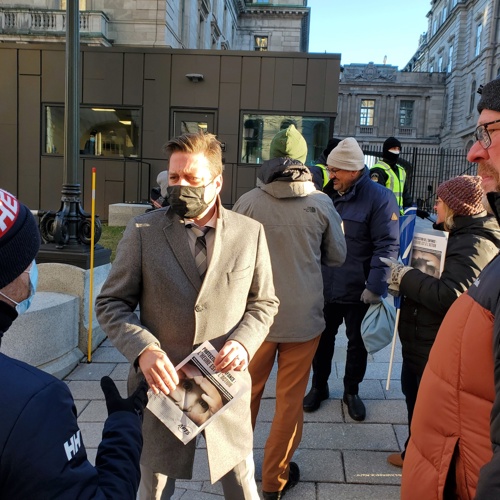Implementing the Laurent Report | APTS calls on MNAs to act now
November 24, 2021

Québec City – More than six months have passed since Régine Laurent submitted the report issued by the Special Commission on the Rights of the Child and Youth Protection. Today, APTS members working in youth centres handed MNAs a memo to remind them of their responsibilities in youth protection. The message: implement the report’s recommendactions without further delay.
“As soon as the Laurent Report was tabled, the APTS undertook to ensure that the report’s recommendactions were implemented. The report garnered a broad consensus among the various political parties, civil society and personnel in youth protection and frontline services. Despite a series of investments announced by Minister Carmant, the situation is still critical in a number of youth centres where staff shortages result in excessive work overload for the remaining employees. We are reiterating our willingness to work with the Ministry of Health and Social Services and the heads of youth facilities, to implement the solutions identified by Ms. Laurent’s team in ways that respect everyone’s skills and expertise, in order to ensure the well-being of children and their families,” declared APTS president Robert Comeau in front of the entrance to the National Assembly reserved for MNAs and staff.
The APTS outlined three areas in which MNAs need to take priority action: governance and legislation, employees’ expertise, and conditions of professional practice in youth protection. The union, which represents the vast majority of professionals and technicians in Québec’s youth protection system, decries the fact that the Legault government failed to consult it when reviewing the standards of practice or drafting the upcoming bill to amend the Youth Protection Act, which will change the approach of the directors of youth protection.
“Any changes to this law or to the conditions of practice will have a direct impact on the organization of work and employees' working conditions. As a union, those are our specific areas of expertise that the government would be well advised to call on if it wants to truly improve the situation at the Director of Youth Protection (DPJ). As Premier Legault himself acknowledged in his speech at the opening of the new parliamentary session, the best people to understand the needs of health and social services are the professionals on the ground. It’s time for the government to accept our offer to help protect what Québec holds dearest,” added Steve Garceau, provincial representative for the Lanaudière region and for the APTS committee on youth centres.
Long waiting lists
The union is also concerned about waiting lists that are still far too long despite multiple investments announced by Minister Carmant, which are slow to yield results on the ground. The situation is particularly flagrant at the DPJ in Laval, where there are now 115 cases awaiting follow-up measures (the 2nd step in the youth protection process), surpassing the 60 cases on the waiting list for assessment and referral (1st step).
“This is a concrete example of the negative effects of a strategy that focuses solely on managing waiting lists at the entry point to the DPJ. A more global strategy needs to be developed in collaboration with all those working with vulnerable children. These children may be in the ‘system,’ but they are not receiving the services prescribed, often by court order. We’re afraid this pattern will be repeated in other regions,” concluded Robert Comeau.
The memo sent to MNAs is found here (in French).
The APTS
The APTS (Alliance du personnel professionnel et technique de la santé et des services sociaux) represents a total of 60,000 members in more than 100 job titles, who play a key role in ensuring that health and social services institutions run smoothly. Our members provide a wide range of services for the population as a whole, including diagnostic, rehabilitation, nutrition, psychosocial intervention, clinical support, and prevention services.

